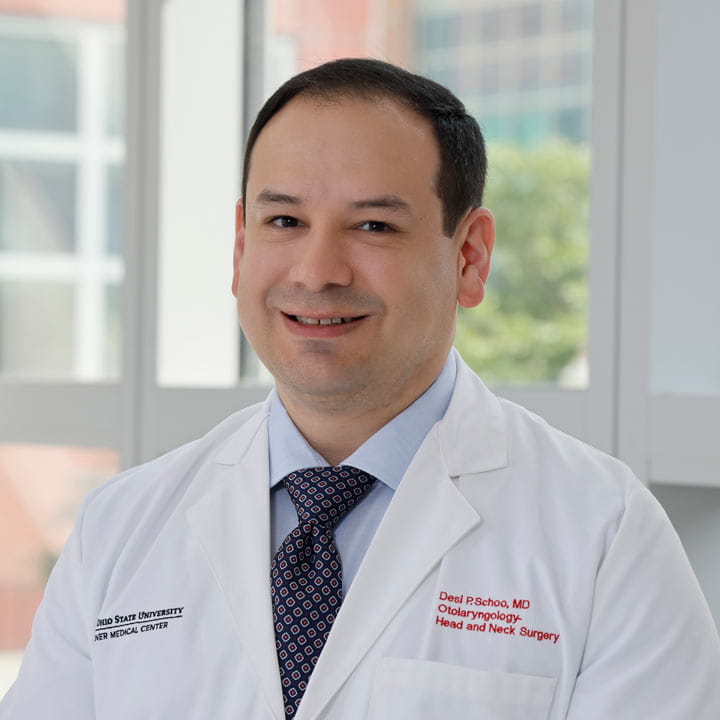 Desi Schoo, MD, believes diagnosing and treating patients with dizziness and inner ear imbalance can be advanced and improved. He joined the Department of Otolaryngology – Head and Neck Surgery at The Ohio State University Wexner Medical Center in August as an assistant professor in the Division of Otology, Neurotology and Cranial Base Surgery.
Desi Schoo, MD, believes diagnosing and treating patients with dizziness and inner ear imbalance can be advanced and improved. He joined the Department of Otolaryngology – Head and Neck Surgery at The Ohio State University Wexner Medical Center in August as an assistant professor in the Division of Otology, Neurotology and Cranial Base Surgery.
Dr. Schoo’s focus is on vestibular clinical care and research. He first became interested in how the inner ear works in medical school at the University of Iowa.
“I was excited by how far ahead the field of otolaryngology was in using technology compared to other specialties, like using cochlear implants to restore hearing,” Dr. Schoo says.
Harnessing technology and collaboration
Today, Dr. Schoo focuses on the early clinical implementation of vestibular implant technology and, more broadly, improving the diagnosis and care of people with inner ear-related dizziness. He comes to Ohio State from Johns Hopkins University School of Medicine, where he recently completed a neurotology fellowship.
As an otolaryngology resident at Johns Hopkins, Dr. Schoo spent two years performing clinical research. He helped lead two first-in-human clinical trials under the mentorship of Charles Della Santina, MD, PhD, director of the Cochlear Implant Center at Johns Hopkins.
Dr. Schoo coordinated the daily operations of a vestibular implant clinical trial, working with the internal regulatory process, and became familiar with the processes the Food and Drug Administration and other regulatory agencies use when trialing a new technology.
He also helped manage the secondary study site at Johns Hopkins for a Novartis-sponsored trial investigating the first-ever gene therapy for hearing loss.
The expertise that Dr. Schoo brings to Ohio State will elevate research efforts and help meet growing patient demand, says Oliver Adunka, MD, director of the Division of Otology, Neurotology and Cranial Base Surgery.
“With Dr. Schoo’s help, we hope to start a Clinical Vestibular Research Center,” Dr. Adunka says.
The division stands ready to support Dr. Schoo in his quest to secure National Institutes of Health research funding and build a career as a clinician-scientist, Dr. Adunka says.
Ohio State plans to offer vestibular implants to patients when the implants become available clinically. The Division of Otology, Neurotology and Cranial Base Surgery cares for patients with inner ear imbalance disorders and other conditions like acoustic neuromas, which often cause imbalance after tumor removal.
The collaborative environment at Ohio State was attractive to Dr. Schoo.
“When you are dealing with vestibular dysfunction, it is not just ear, nose and throat specialists who need to be invested,” Dr. Schoo says. “It’s important to have neurologists, physical therapists, experienced vestibular audiologists and other specialists all interested in improving the same pathway for patients. That community already exists here.”
Dr. Schoo is working to establish a multidisciplinary team to help direct patients to specific specialists and the treatments that will help them best.
Improving diagnosis and care through research
There’s growing interest in research centered on vestibular disorders. The advancement of implant technology has reinvigorated some of these investigations, Dr. Schoo says.
During his residency and fellowship, Dr. Schoo also explored ways to improve the diagnosis and treatment of vestibular disorders.
There’s still more to learn about how patients with vestibular dysfunction recover. One group Dr. Schoo feels uniquely qualified to help is patients recovering after acoustic neuroma surgery. An acoustic neuroma (vestibular schwannoma) is a benign tumor that grows on the balance nerves as they head toward the inner ear. Growth and treatment of the tumor cause loss of balance function in the ear. While vestibular rehabilitation therapy is often an effective treatment for the imbalance experienced, Dr. Schoo wonders if more can be done.
“Persistent dizziness and imbalance after acoustic neuroma treatment can be one of the most impactful symptoms to manage long-term,” he says.
"The large number of acoustic neuroma patients seen at Ohio State as part of a multidisciplinary team with neurosurgery makes this an ideal environment to develop therapeutic strategies to improve these patients lives," adds James Rocco, MD, PhD, professor and chair of the Department of Otolaryngology - Head and Neck Surgery.
At Ohio State, Dr. Schoo will look for ways to improve dizziness and imbalance in patients with acoustic neuroma, as well as in all patients with dizziness and imbalance from the inner ear. He’ll spend time on research and see patients in the clinic, which will allow Dr. Schoo to take those patient experiences and use them to guide his research so that he can help patients improve their own outcomes.
“The department understands what it takes for junior investigators to get started in research in terms of providing support and mentoring,” Dr. Schoo says.

2024 Year in Review
See how Ohio State is shaping the field of Otolaryngology – Head and Neck Surgery.
